Asifali
On this page, you find all documents, package deals, and flashcards offered by seller asifali.
- 70
- 0
- 0
Community
- Followers
- Following
70 items

COUNTING CALORIES Background
All foods contain energy, although the amount of potential energy stored will vary greatly depending on the type of food. When we eat food, our bodies convert the stored energy to chemical energy, allowing us to do work. The energy values of food are measured by the Calorie, with a capital C. A Calorie is equal to 1,000 calories or 1 kilocalorie (kcal).
- Other
- • 4 pages •
All foods contain energy, although the amount of potential energy stored will vary greatly depending on the type of food. When we eat food, our bodies convert the stored energy to chemical energy, allowing us to do work. The energy values of food are measured by the Calorie, with a capital C. A Calorie is equal to 1,000 calories or 1 kilocalorie (kcal).

COUNTING CALORIES Background
All foods contain energy, although the amount of potential energy stored will vary greatly depending on the type of food. When we eat food, our bodies convert the stored energy to chemical energy, allowing us to do work. The energy values of food are measured by the Calorie, with a capital C. A Calorie is equal to 1,000 calories or 1 kilocalorie (kcal).
- Other
- • 4 pages •
All foods contain energy, although the amount of potential energy stored will vary greatly depending on the type of food. When we eat food, our bodies convert the stored energy to chemical energy, allowing us to do work. The energy values of food are measured by the Calorie, with a capital C. A Calorie is equal to 1,000 calories or 1 kilocalorie (kcal).

COUNTING CALORIES Background
All foods contain energy, although the amount of potential energy stored will vary greatly depending on the type of food. When we eat food, our bodies convert the stored energy to chemical energy, allowing us to do work. The energy values of food are measured by the Calorie, with a capital C. A Calorie is equal to 1,000 calories or 1 kilocalorie (kcal).
- Other
- • 4 pages •
All foods contain energy, although the amount of potential energy stored will vary greatly depending on the type of food. When we eat food, our bodies convert the stored energy to chemical energy, allowing us to do work. The energy values of food are measured by the Calorie, with a capital C. A Calorie is equal to 1,000 calories or 1 kilocalorie (kcal).
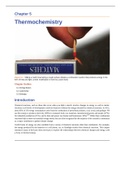
Thermochemistry. 1.Energy Basics 2.Calorimetry 3.Enthalpy
Chemical reactions, such as those that occur when you light a match, involve changes in energy as well as matter. Societies at all levels of development could not function without the energy released by chemical reactions. In 2012, about 85% of US energy consumption came from the combustion of petroleum products, coal, wood, and garbage.We use this energy to produce electricity (38%); to transport food, raw materials, manufactured goods, and people (27%); for industrial production (21%); and...
- Other
- • 50 pages •
Chemical reactions, such as those that occur when you light a match, involve changes in energy as well as matter. Societies at all levels of development could not function without the energy released by chemical reactions. In 2012, about 85% of US energy consumption came from the combustion of petroleum products, coal, wood, and garbage.We use this energy to produce electricity (38%); to transport food, raw materials, manufactured goods, and people (27%); for industrial production (21%); and...
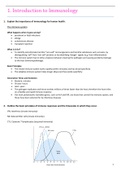
Introduction to Immunology
Explain the importance of immunology for human health. The immune system
- Other
- • 47 pages •
Explain the importance of immunology for human health. The immune system
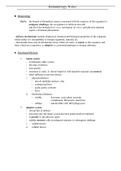
Immunology Notes. innate system evolutionary older system first line of defence non-specific resistance
Immunology Def'n: the branch of biomedical science concerned with the response of the organism to antigenic challenge, the recognition of self from non-self, and all of the biological (in vivo), serological (in vitro), and physical chemical aspects of immune phenomena defence mechanisms include all physical, chemical and biological properties of the organism which reduce it's susceptibility to foreign organisms, material, etc. functionally these may be divided into those which are stati...
- Other
- • 27 pages •
Immunology Def'n: the branch of biomedical science concerned with the response of the organism to antigenic challenge, the recognition of self from non-self, and all of the biological (in vivo), serological (in vitro), and physical chemical aspects of immune phenomena defence mechanisms include all physical, chemical and biological properties of the organism which reduce it's susceptibility to foreign organisms, material, etc. functionally these may be divided into those which are stati...
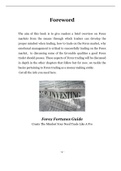
Forex Fortunes Guide - create the strong mindset to trade like a pro
The aim of this book is to give readers a brief overview on Forex markets from the means through which traders can develop the proper mindset when trading, how to trade on the Forex market, why emotional management is critical to successfully trading on the Forex market, to discussing some of the favorable qualities a good Forex trader should posses. These aspects of Forex trading will be discussed in depth in the other chapters that follow but for now, we tackle the basics pertaining to Forex t...
- Summary
- • 33 pages •
The aim of this book is to give readers a brief overview on Forex markets from the means through which traders can develop the proper mindset when trading, how to trade on the Forex market, why emotional management is critical to successfully trading on the Forex market, to discussing some of the favorable qualities a good Forex trader should posses. These aspects of Forex trading will be discussed in depth in the other chapters that follow but for now, we tackle the basics pertaining to Forex t...
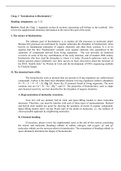
Introduction to Biochemistry
The ultimate goal of biochemistry is to explain all life processes in molecular detail. Because life processes are performed by organic molecules the discipline of biochemistry relies heavily on fundamental principles of organic chemistry and other basic sciences. It is of no surprise that the first "biochemists" actually were organic chemists who specialized in the chemistry of compounds derived from living organisms. The text provides an historical overview of some of the key contributi...
- Other
- • 14 pages •
The ultimate goal of biochemistry is to explain all life processes in molecular detail. Because life processes are performed by organic molecules the discipline of biochemistry relies heavily on fundamental principles of organic chemistry and other basic sciences. It is of no surprise that the first "biochemists" actually were organic chemists who specialized in the chemistry of compounds derived from living organisms. The text provides an historical overview of some of the key contributi...
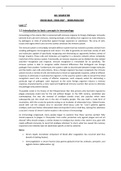
introduction to basic concepts in immunology
Immunology is the science that is concerned with immune response to foreign challenges. Immunity (derived from Latin term immunis, meaning exempt), is the ability of an organism to resist infections by pathogens or state of protection against foreign organisms or substances. The array of cells, tissues and organs which carry out this activity constitute the immune system.
- Other
- • 88 pages •
Immunology is the science that is concerned with immune response to foreign challenges. Immunity (derived from Latin term immunis, meaning exempt), is the ability of an organism to resist infections by pathogens or state of protection against foreign organisms or substances. The array of cells, tissues and organs which carry out this activity constitute the immune system.
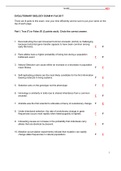
EVOLUTIONARY BIOLOGY EXAM
Test and improve your knowledge of Evolutionary Biology with fun multiple choice exams
- Other
- • 7 pages •
Test and improve your knowledge of Evolutionary Biology with fun multiple choice exams
